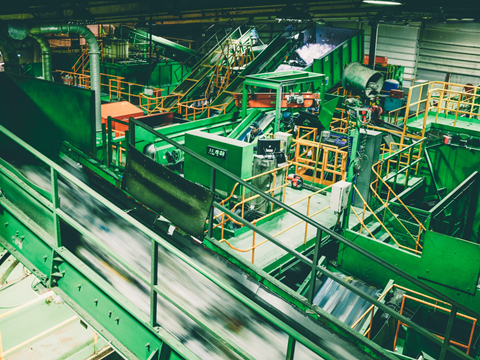
Re-Gen is utilizing Polytag’s watermarking technology to accurately count individual items of packaging among the 250,000 tonnes of mixed household waste recycled at its Newry material recovery facility every year.
Claimed to be the second largest material recovery facility in the UK, Re-Gen’s facility in Newry claims to handle 25% of all the waste generated in Northern Ireland, as well as materials from the Republic of Ireland, England, Scotland, and Wales.
Now it will make use of Polytag’s Invisible Watermarks; these are invisible to the human eye and printed onto the surface of a pack. During the recycling stage, these watermarks are detected by Polytag Detection Units using UV lights.
This process enables brands to access ‘never-seen-before’, real-time data about the life cycle of their products. From this, businesses can collect the relevant information for Digital Waste Tracking, Extended Producer Responsibility, and other legislative reporting requirements, as well as set their own internal ESG targets.
Polytag’s work with Re-Gen is set to contribute to its Ecotrace Programme, in which it plans to deploy Plastic Detection Units across twelve material recovery facilities and cover 50% of the UK’s household recycling waste stream.
“Our partnership with Re-Gen marks a significant milestone in optimising recycling processes across the UK, with the Newry facility being a key site in this mission,” said Polytag CEO Alice Rackley.
“As the second largest MRF in the UK, processing vast quantities of mixed-stream waste, our technology will allow the site to manage packaging and waste on a truly large scale – a game-changer for improving recycling rates and driving us closer to a circular economy.
“After all, what can be measured can be managed, and our technology enables precise tracking, tracing, and detection of materials, which is essential for achieving these goals.
“Through the Polytag Ecotrace Programme, we aim to revolutionize how stakeholders navigate the circular economy and by deploying our technology at this high-capacity site, we are unlocking invaluable insights and driving innovation for the benefit of all.
“We’re excited to see where this partnership takes us and how, together, we can continue to lead the charge in enhancing the UK’s recycling rates and reducing carbon emissions.”
Joseph Doherty, chief executive at Re-Gen, continued: “We are proud to partner with Polytag to trial their innovative Plastic Detection Unit at our Newry facility.
“At Re-Gen, we are constantly investing in advanced technology to improve our processes and remain leaders in the recycling industry. This collaboration demonstrates our commitment to adopting cutting-edge solutions that enhance recycling efficiency and provide valuable insights into packaging lifecycles.
“By embracing innovations like Polytag’s Ecotrace Programme, we’re driving the industry forward and contributing to a more sustainable future for today and generations to come.”
A similar collaboration took place last year, when Polytag worked with Aldi to apply UV tags to its packaging and gather real-time recycling data on an item level. The retailer hoped that such information would help track its progress towards its sustainability targets, including a 50% reduction in its carbon footprint by 2025.
More recently, M&S announced its participation in the Ecotrace Programme. It expects to collect barcode-level data about the location, time, and amount of its single-use packaging collected and sorted at recycling centres in the UK, which will become a ‘verified benchmark’ for its used plastic packaging recycling rate.
Ocado Retail is also working with Polytag, but this time to apply Digital Link QR codes to its reusable packaging. Consumers can scan the codes with a smartphone to access a landing page with instructions for refilling and returning Ocado products; this is hoped to encourage reuse behaviours and lessen single-use plastic waste.
On a broader scale, the HolyGrail 2.0 initiative seeks to bring accurate sorting to scale and digitize the sorting of post-consumer packaging waste via an open and interoperable system. In a recent update, GS1 sought to help the initiative develop an Open Data Architecture for an intelligent sorting ecosystem and ensure that every industry player can contribute effectively to the infrastructure.
If you liked this story, you might also enjoy:
The ultimate guide to the Packaging and Packaging Waste Regulation in 2024
How are the top brands progressing on packaging sustainability?
Sustainable Innovation Report 2024: Current trends and future priorities
Everything you need to know about global plastic sustainability regulation














No comments yet